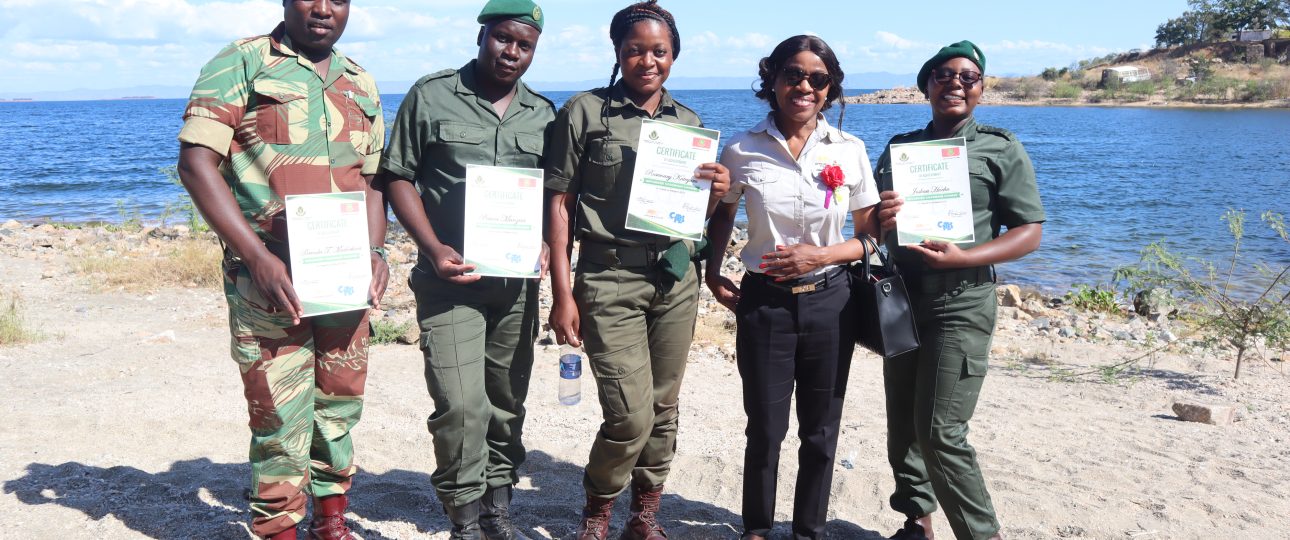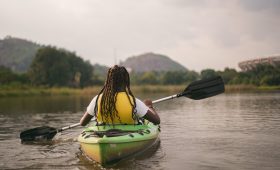KARIBA, Zimbabwe: The African Wildlife Foundation Zimbabwe (AWF) celebrated the graduation of 15 advanced coxswain trainees who completed a rigorous 3-week course on wildlife conservation and anti-poaching in water-based environments. The event was held at Moth Camp in Kariba and attended by representatives from AWF, the Zimbabwe Parks and Wildlife Management Authority (Zimparks) and the Zimbabwe National Army (ZNA) Boat Squadron Regiment.
The coxswain training was funded by the European Union (EU) under the Convention on International Trade in Endangered Species, Monitoring the Illegal Killing of Elephants (CITES MIKE) project. It aimed to enhance the capacity of Zimparks and ZNA personnel to conduct effective river patrols and protect wildlife from poachers. The training covered topics such as handling of suspects, observing human rights in anti-poaching work, first aid, physical training, weapon handling, embarking and disembarking water vessels, ecology, routine ambush and raiding patrols, boat operations, and other relevant modules to improve river patrols.
Out of the 15 graduates, 12 (including two women) came from Zimparks while three were from ZNA. Rosemary Kateguru, a ranger operating from the Zambezi River Specialized Anti-Poaching Unit (ZARSAU) scooped an accolade as one of the best Advanced Coxswain trainees. In December 2021, Kateguru, who hails from the Doma community, became the first Class 1 holder of the Launch-Master Coxswain certificate, which allows her to operate big boats in Zimbabwe.
“These trainings have continued to recognize the importance and capabilities of the girl child as we continue to value the need for gender balance and equality. I applaud [women] for continuing to defy the odds and for showing that female rangers can even outcompete their male counterparts by participating in more risky tasks such as operating in turbulent waters of Lake Kariba and other water bodies,” said Zimparks Director of Operations Arthur Musakwa, who addressed the pass out parade on behalf of Zimparks Director General DR. Fulton Mangwanya.
He underscored the importance of support rendered by AWF in setting up ZARSAU, a water based anti-poaching specialized unit operating from below the Kariba Dam Wall to Kanyemba. He said, “This unit has become a vanguard for the conservation of the aquatic as well as terrestrial resources in the landscape as they have forged collaborative links with our Zambian counterparts. This support has continued to improve the efficiency of law enforcement and has also brought about desired conservation outcomes.”
AWF Zimbabwe Country Director Olivia Mufute noted that the training was very tough. “I am very happy with the thorough and rigorous advanced coxswain training that the rangers completed. These efforts will further strengthen the capacity and effectiveness of Zimparks rangers, particularly for rangers who conduct anti-poaching river and land patrols within the Mid-Zambezi Valley landscape. With these advanced skills, Zimparks rangers will be instrumental in conducting local as well as transboundary patrols and can contribute significantly to species protection and reducing illegal wildlife trade and trafficking.”

“The training of rangers on river anti-poaching patrols is in line with AWF Zimbabwe’s 10-year Conservation Strategy (2020-2030) which spells out the need to conserve Zimbabwe’s wildlife, reduce poaching and trafficking through supporting wildlife monitoring and protection systems. I believe concerted efforts from all stakeholders in the conservation circles will go a long way in conserving our megafauna and flora,” Mufute said.
Thomas Zhou, a 25-year-old ranger operating from Chewore North in Kapirinhengu area in the Mid-Zambezi Valley landscape won the best student award. He said, “Both coxswain trainings have benefitted us because the way we contact anti-poaching river patrols is now advanced compared to what we used to do before. Now we can conduct our river patrols in a professional way and now we know how to deal with poachers who dive into the waters to escape arrest among other issues,” he added.
“The training was tough this time. One would spend up to three hours swimming to enable him or her to deal with difficult situations,” said Rosemary Kateguru, noting the skills gained in arresting a suspect, ambushing, and other processes involved in anti-poaching river patrol work.
The training support, which includes courses on court procedures and digital wildlife monitoring, has helped to strengthen local and transboundary anti-poaching patrol effectiveness in the Mid-Zambezi Valley as shown by a number of joint cross border patrols done by Zimbabwe and Zambia law enforcement agents.
The AWF Coxswain Training Program
15 trainees undertook a three-week long advanced coxswain training: twelve rangers from the Zimparks (including two women) and three personnel from the Zimbabwe National Army (ZNA. The advanced coxswain training is enhancing the first one done in 2021 which saw trainees completing their Launch- Master Coxswain a 7-week course on skills required when conducting river patrols.
About AWF
AWF is one of the largest and oldest African international conservation organization with over 60 years of visionary conservation leadership. It focuses on building a future for Africa where people and wildlife thrive, through an African-led conservation agenda. AWF strategies for conservation bridge science, on-the-ground solutions, policy, and education.
AWF works directly in 10 countries across 17 landscapes, and its networks, business development, and policy approaches span the African continent. In Zimbabwe, AWF started project implementation from 1999 to date and has been spearheading life-changing projects and programs in the Mid Zambezi Valley landscape to impact communities in wildlife areas.
Since 2018, AWF invested over USD 10 million in the Mid Zambezi Valley through infrastructural developments, provision, and digitalization of radio communication equipment, providing fuel, field and camping equipment, patrol rations, vehicles and boats for anti-poaching patrols, and facilitating specialized training and capacity building programs for rangers as part of efforts to combat poaching and reduce illegal wildlife trade and trafficking of wildlife products in the landscape.



